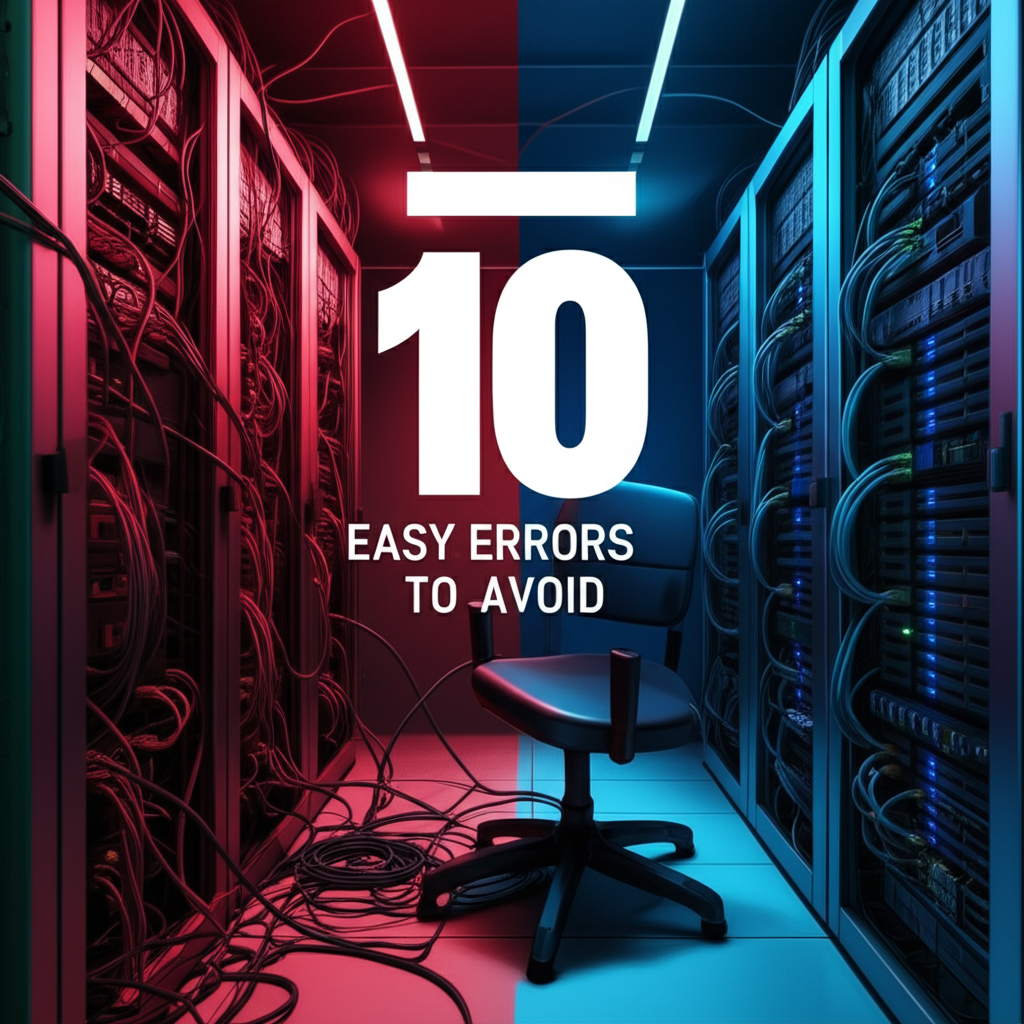- Common Hosting Mistakes: Choosing the Wrong Plan
- Evaluating Your Needs to Avoid Hosting Mistakes
- Neglecting Website Security
- Secure Your Website to Avoid Future Issues
- Ignoring Website Backups
- Implement a Robust Backup Strategy
- Overusing Shared Resources
- Hosting Mistakes: Poor Content Delivery Network (CDN) Integration
- Choosing a Hosting Provider Based Solely on Price
- Prioritize Performance and Reliability
- Not Optimizing Website Performance
- Optimize Your Website for Speed
- Hosting Mistakes: Failing to Monitor Website Performance
- Ignoring Website Analytics
- Hosting Mistakes: Not Scaling Your Hosting as Your Website Grows
Hosting Mistakes: 10 Easy Errors to Avoid When Setting Up Your Website
Hosting mistakes can be detrimental to a website’s performance, security, and overall success. Choosing the right hosting provider and configuring your setup correctly is crucial for a smooth online presence. From selecting the wrong plan to neglecting security measures, seemingly small errors can lead to significant problems down the line. This article outlines ten common hosting mistakes that are easy to make but equally easy to avoid with a little foresight and planning.
Common Hosting Mistakes: Choosing the Wrong Plan

One of the most frequent hosting mistakes is opting for the cheapest hosting plan without considering your website’s actual needs. While budget considerations are important, a shared hosting plan might not be suitable for a resource-intensive website with high traffic volume. This can lead to slow loading speeds, downtime, and a poor user experience. Similarly, choosing a powerful dedicated server when a simple shared plan would suffice is a waste of resources. Carefully evaluate your website’s requirements in terms of storage, bandwidth, and expected traffic before making a decision.
Evaluating Your Needs to Avoid Hosting Mistakes
Before settling on a hosting plan, analyze your website’s current resource usage and project its future needs. Consider factors like the number of pages, multimedia content, average daily visitors, and anticipated growth. Tools like Google Analytics can provide valuable insights into your website’s traffic patterns.
Neglecting Website Security
Failing to implement adequate security measures is another critical hosting mistake. Leaving your website vulnerable to attacks can result in data breaches, malware infections, and reputational damage. Ensure your hosting provider offers robust security features like firewalls, SSL certificates, and regular malware scanning.
Secure Your Website to Avoid Future Issues
Proactive security measures are crucial. Implement strong passwords, keep your software updated, and consider using a Web Application Firewall (WAF) to protect against common web exploits. Regularly back up your website data to ensure you can quickly recover from any unforeseen issues.
Ignoring Website Backups
Speaking of backups, neglecting to create regular backups of your website is a recipe for disaster. Hardware failures, software glitches, or even accidental deletions can wipe out your entire website in an instant. Ensure your hosting provider offers automated backup solutions or implement your own backup strategy.
Implement a Robust Backup Strategy
Establish a regular backup schedule, ideally daily or weekly, depending on the frequency of website updates. Store your backups in a secure offsite location or utilize cloud storage services for added redundancy.
Overusing Shared Resources
If you’re on a shared hosting plan, exceeding the allocated resources can negatively impact your website’s performance and even affect other websites sharing the same server. Monitor your resource usage and upgrade to a higher-tier plan if necessary.
Hosting Mistakes: Poor Content Delivery Network (CDN) Integration
A CDN can significantly improve website loading speeds for visitors across different geographical locations. However, improper CDN integration can lead to configuration conflicts and caching issues, negating its benefits. Ensure your CDN is correctly configured and compatible with your hosting environment.
Choosing a Hosting Provider Based Solely on Price
While cost is a factor, solely focusing on price can lead to choosing a provider with poor performance, unreliable support, and limited features. Research different providers, compare their offerings, and read reviews before making a decision.
Prioritize Performance and Reliability
A reliable hosting provider with excellent uptime and responsive customer support is essential for a successful online presence. Don’t compromise on these factors just to save a few dollars.
Not Optimizing Website Performance
Even with a good hosting plan, neglecting website optimization can lead to slow loading speeds and a poor user experience. Optimize images, minimize HTTP requests, and leverage browser caching to enhance performance.
Optimize Your Website for Speed
Use tools like Google PageSpeed Insights to identify areas for improvement and implement recommended optimizations. A fast-loading website contributes to a positive user experience and improved search engine rankings.
Hosting Mistakes: Failing to Monitor Website Performance
Regularly monitoring website performance is crucial for identifying potential issues before they escalate. Use monitoring tools to track uptime, server response time, and resource usage.
Ignoring Website Analytics
Website analytics provide valuable insights into visitor behavior, traffic sources, and conversion rates. Ignoring these data points can lead to missed opportunities for improvement and growth.
Hosting Mistakes: Not Scaling Your Hosting as Your Website Grows
As your website grows, its hosting needs will evolve. Failing to scale your hosting accordingly can lead to performance bottlenecks and downtime. Regularly assess your website’s resource usage and upgrade your hosting plan as needed.
By avoiding these common hosting mistakes, you can ensure a smooth, secure, and successful online presence for your website. Taking the time to plan and implement the right hosting strategy from the start will pay dividends in the long run.











Leave a Reply